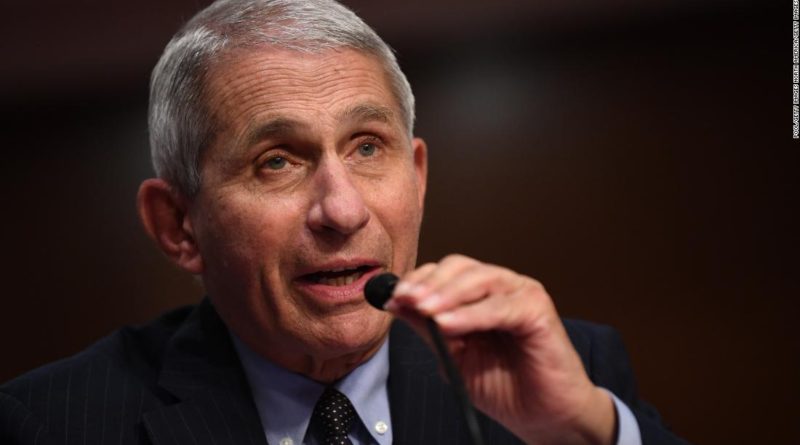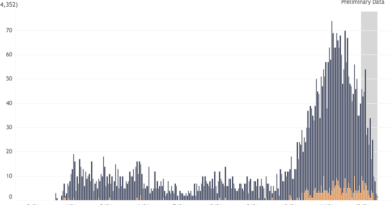US coronavirus: Covid-19 vaccine likely won’t be ‘widely available’ until several months into 2021, Fauci says
Dr. Anthony Fauci, the director of the National Institute of Allergy and Infectious Diseases, reminded Americans that even if a vaccine candidate gets through the testing process and is successful by the end of the year, it will be several months before vaccination is widespread across the US.
“I think as we get into 2021, several months in, that you would have [a] vaccine that would be widely available to people in the United States,” Fauci told the Washington Post’s Bob Costa during a Post Live event.
That means spring 2021 at the soonest.
Fauci noted that some companies have claimed they could have a vaccine available before the end of the year. “I’m a little skeptical about that, but, you know, anything is possible,” he told the Post.
But Fauci says he’s confident a vaccine will be able to stop the pandemic in its tracks, once it’s widely available.
Fauci also said that as many people as possible should get vaccinated for influenza this year, since the pandemic will complicate flu season.
The other sobering message came from the Centers for Disease Control and Prevention.
A new survey found that coronavirus symptoms can linger for weeks, even among otherwise healthy young adults who don’t have severe symptoms.
One in five people 18 to 34 said they had lingering symptoms, usually fatigue or a cough. The older people were, the more likely they were to have lingering symptoms.
US cases top 4 million
California reported 159 additional deaths from the coronavirus on Friday, according to data from the California Department of Public Health. That’s the highest number recorded in a single day since the start of the pandemic, and two more than Thursday.
The Georgia Department of Public Health reported 4,813 new cases. That’s the highest number of new cases reported in a 24-hour period.
More than 150 prominent US medical experts, scientists, teachers, nurses and others have signed a letter to political leaders urging them to shut down the country and start over to contain the surging coronavirus pandemic.
“Right now we are on a path to lose more than 200,000 American lives by November 1st. Yet, in many states people can drink in bars, get a haircut, eat inside a restaurant, get a tattoo, get a massage, and do myriad other normal, pleasant, but non-essential activities,” the letter said.
The World Health Organization on Friday said 284,196 new Covid-19 cases were reported in the last 24 hours, according to a situation report. The previous high was set last Saturday, with 259,848 newly reported cases.
The total number of cases reported to WHO from around the globe is now nearly 15.3 million.
How states are handling major outbreaks
Cases are starting to plateau in the four states — Texas, California, Arizona and Florida — that have seen large increases, Dr. Deborah Birx, the White House Coronavirus Task Force coordinator, said Friday.
Birx compared what’s been going on in these states to the outbreak in New York in the spring, adding “it’s very serious and it’s very real.”
A judge in Starr County, Texas, issued a shelter-at-home order until August 11. It went into effect Friday morning. Starr County, along the US-Mexico border, includes Rio Grande City.
States across the country are struggling with local outbreaks.
New Mexico, Hawaii and Missouri all reported records for new daily cases Thursday.
For the fourth straight day, Los Angeles County reported more than 2,000 additional confirmed cases, Health Officer Muntu Davis announced in a news briefing.
And officials in Alaska began isolating, monitoring and caring for 96 employees of a seafood processing plant in Seward, according to a news release from the Alaska Department of Health and Social Services. CNN has reached out to the company, OBI Seafoods, for comment.
Citing an increasing rate of transmission, Washington Gov. Jay Inslee announced the state is tightening restrictions on restaurants, bars, fitness centers, movie theaters, weddings and funerals.
Where the new school year stands
The resurgence in cases, and likely ongoing presence of the virus, has ignited debate about how to proceed with the new school year.
Vice President Mike Pence was expected to participate in a roundtable discussion about reopening Indiana schools, according to his official schedule.
In Texas, Houston Mayor Sylvester Turner and Harris County Judge Lina Hidalgo announced Friday that schools in the metropolitan area will also delay in-person classes until September 8.
“We are all desperate to move on from this crisis and get life back to normal. September 8 is still likely too soon, but the truth is, the fastest way we can all work together to bring this virus under control, the sooner we will be in a position to reopen again for the long term,” Hidalgo said in a statement.
New Mexico Gov. Michelle Lujan Grisham announced a similar delayed start to school on Thursday.
By contrast, Tennessee Gov. Bill Lee said his state will introduce a plan Tuesday to reopen schools.
New guidance from the CDC is strongly in favor of sending students back to the classroom, saying that available evidence shows that coronavirus does not possess as great a risk to children. With the services and instruction offered in school, the CDC guidance said virtual learning can be a disadvantage to American students.
Learning more on risks to mothers and infants
Researchers are still learning how the virus impacts certain groups, with results sometimes changing earlier guidance.
New guidance from the American Academy of Pediatrics released Wednesday said that mothers infected with the virus can safely stay in the same room as their newborns if safety measures are taken.
“What we now know is the risk of the newborn becoming infected around the time of birth is low when safety precautions are taken to protect the baby,” said lead author of the guidance Dr. Karen Puopolo in a statement. “In fact, the risk in the short-term appears to be no greater if mother and infant room-in together using infection control measures compared to physical separation of the infant in a room separate from the mother.”
A study published in The Lancet Child & Adolescent Health supported that guidance.
Researchers reported no cases of viral transmission among 120 babies born to 116 Covid-positive mothers, even when both shared a room and the mothers breastfed.
CNN’s Marisa Peryer, Jennifer Henderson, Jacqueline Howard, Eileen McMenamin, Shelby Lin Erdman and Janine Mack contributed to this report.








